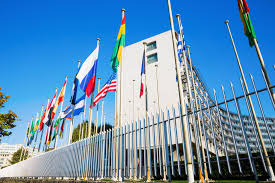Following a decade-long disagreement prompted by the organization’s decision to admit Palestine as a member, the United States stated Monday that it planned to rejoin and pay more than $600 million in back dues.
According to U.S. officials, the decision to return was driven by worry that China is stepping into the U.S.’s place in UNESCO policymaking, particularly in creating global standards for artificial intelligence and technology education.
After UNESCO voted to admit Palestine as a member state in 2011, the United States and Israel stopped supporting the organization, and the Trump administration made the decision in 2017 to completely withdraw from the organization the following year, claiming long-standing anti-Israel bias and management issues.
The decision to rejoin was formally announced last week in a letter sent to UNESCO Director General Audrey Azoulay by U.S. Deputy Secretary of State for Management and Resources Richard Verma. According to the hand-delivered letter, Verma praised progress in depoliticizing the discussion of the Middle East at UNESCO and modernizing the organization’s management.
In the somber UNESCO auditorium, cheers erupted when Azoulay informed the ambassadors of the plan during a special meeting on Monday. Delegate after delegate rose to applaud the announcement. A vote by the 193 member states of the organization, including the U.S., which was formerly its largest donor, is anticipated to take place next month, according to a UNESCO ambassador.
The United Nations Educational, Scientific, and Cultural Organization, well-known for its World Heritage program as well as initiatives to combat climate change and encourage girls to read, would benefit financially greatly from the decision.
Jin Yang, China’s ambassador to UNESCO, stated that his nation “appreciates” UNESCO’s attempts to win back the U.S., claiming that its absence had a “negative impact” on the organization’s operation.
“Being a member of an international organization is a serious issue, and we hope that the U.S. return this time means it acknowledges the mission and the goals of the organization,” the ambassador stated.
Azoulay has tried to address the reasons the U.S. left through budget reforms and fostering cooperation among Jordanian, Palestinian, and Israeli diplomats on touchy UNESCO issues ever since she was elected in 2017. Jewish Azoulay received high appreciation from UNESCO ambassadors for her efforts to personally allay American worries over Israel in particular.
According to Azoulay, the U.S. decision to return “is the result of five years of work, during which we calmed tensions, particularly in the Middle East, improved our response to contemporary challenges, resumed major initiatives on the ground, and modernized the functioning of the organization.
According to a UNESCO ambassador, she met with Democrats and Republicans in Washington to discuss their efforts. Regardless of who wins next year’s presidential election, UNESCO diplomats expressed confidence that the U.S. choice to return is one that will be made for the long term as a result of those bipartisan conversations.
The diplomats weren’t allowed to discuss the behind-the-scenes effort that resulted in the U.S. decision in public.
According to the proposal, the United States will pay its 2023 dues in addition to $10 million in bonus contributions this year that would be used to fund Holocaust education, the preservation of Ukrainian cultural heritage, journalist safety, and science and technology education in Africa.
The Biden administration has already asked for $150 million for UNESCO dues and back payments in the 2024 budget. Similar requests will be made in the upcoming years up until the $619 million debt is fully repaid, according to the plan.
That accounts for a sizable portion of the $534 million annual operating budget for UNESCO. Before departing, the U.S. provided 22% of the total funds for the organization.
The United States’ withdrawal from UNESCO, according to Undersecretary of State for Management John Bass, has strengthened China and “undermines our ability to be as effective in promoting our vision of a free world.”
He claimed that UNESCO plays a significant role in establishing and influencing global norms for science and technology education, and that “if we’re really serious about the digital-age competition with China… we can’t afford to be absent any longer.”
The agency experienced financial uncertainty as a result of the U.S. absence. Diplomats from UNESCO cited tight budgets for all of the organization’s operations and active initiatives by Azoulay to increase voluntary financing from other nations to fill in the gaps.
The return of U.S. hoped one diplomat would bring “more ambition, and more serenity” and rekindle initiatives to control artificial intelligence, educate girls in Afghanistan, and document slaves in the Caribbean.
The envoy declared that if Israel decided to rejoin, the organization would also “welcome” it back. The Israeli government didn’t respond right away.
Israel has always charged that the UN is biased against it. The U.N. General Assembly recognized Palestine as a nonmember observer state in 2012, despite the protests of Israel. The West Bank, east Jerusalem, and the Gaza Strip are regions claimed by the Palestinians for an independent state and were taken by Israel in the 1967 Middle East conflict. Israel claims that the Palestinians’ attempts to gain U.N. recognition are attempts to evade a negotiated agreement and compel Israel into making compromises.
Previously, the United States withdrew from UNESCO in 1984 during the Reagan administration because it believed the organization to be poorly run, corrupt, and exploited to further Soviet objectives. It came back in 2003.

















